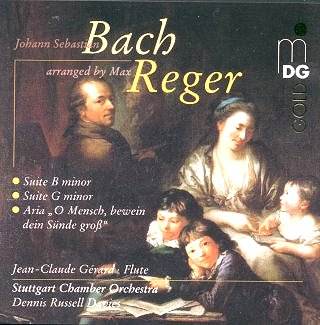JS BACH arranged by Max REGER
Suite in G Minor, Suite for Flute and Strings
 Stuttgart Chamber Orchestra
conducted by Dennis Russell Davis Jean-Claude Gérard
Stuttgart Chamber Orchestra
conducted by Dennis Russell Davis Jean-Claude Gérard
 MDG GOLD 321 0940-2
*[51:01]
MDG GOLD 321 0940-2
*[51:01]

Reger (1873-1916) regarded JS Bach as "the beginning of all music", giving
over two hundred concert's of Bach's music and being influenced by Bach in
his own compositions. Reger did not want to ossify Bach, describing the composer
as "a man of flesh and blood, full of vigour and vitality…", and if
we should make the mistake of presuming 'dumbing-down' is a recent phenomenon,
Reger was a man with a mission to make Bach accessible to contemporary audiences
through arrangements in the style of the modern concert hall. Doubtless Reger
did not feel Bach needed 'improving', but even as the self-satisfied late
romantic era, so utterly sure of its neo-Darwinian superiority over all that
had come before, was dying in the conflagration of the Great War, audiences
were more likely to accept something as old and boring as Bach on their own
terms.
The Suite in G Minor (1915) appropriates various parts of Bach's catalogue.
The five movements are adapted from Partita's 2 & 5, and the English
suites 2-4. Reger requested that the finished work be published as
Bach-Reger-Suite, acknowledgement that the finished work goes beyond
orchestration and arrangement into new composition. Keys are changed, and
the orchestral textures are post-Wagner by way of Brahms. Yet there is still
a lightness and a clear invention, which when combined with the early
20th century sense of the dramatic is refreshingly distinctive.
The Suite for Flute and Strings is one of three orchestral suites
published in 1915-6, though the continuo part used for this recording is
a version prepared in 1911. The work is based on Bach's Suite No.2 in
B minor, and more an arrangement than an original composition, illustrating
how Bach sounded on modern instruments before the early music revival began.
It is certainly a very attractive recording and contrasts strikingly with
the much more heavily romanticised hybrid Suite in G Minor, a piece
which seems especially dislocated in time. The programme is completed by
a gravely beautiful string arrangement of the aria, also from 1915, O
Mensch bewein dein Süunde groB. Sensibly this shorter piece divides
the two main works, though if Reger's arrangements as a whole lay the foundations
for 20th century neo-classicism, here perhaps is the seed for
Barber's Adagio for Strings, and in its quiet, concentrated intensity,
it is the most affecting of the three works in the programme.
An unusual album, immaculately produced, with sensitive string playing and
good solo work from flautist Jean-Claude Gérard, this disc may be
of limited interest but still rewards attention.
Reviewer
Gary S. Dalkin


![]()